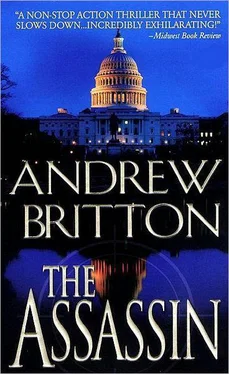Andrew Britton - The Assassin
Здесь есть возможность читать онлайн «Andrew Britton - The Assassin» весь текст электронной книги совершенно бесплатно (целиком полную версию без сокращений). В некоторых случаях можно слушать аудио, скачать через торрент в формате fb2 и присутствует краткое содержание. Жанр: Триллер, на английском языке. Описание произведения, (предисловие) а так же отзывы посетителей доступны на портале библиотеки ЛибКат.
- Название:The Assassin
- Автор:
- Жанр:
- Год:неизвестен
- ISBN:нет данных
- Рейтинг книги:3 / 5. Голосов: 1
-
Избранное:Добавить в избранное
- Отзывы:
-
Ваша оценка:
- 60
- 1
- 2
- 3
- 4
- 5
The Assassin: краткое содержание, описание и аннотация
Предлагаем к чтению аннотацию, описание, краткое содержание или предисловие (зависит от того, что написал сам автор книги «The Assassin»). Если вы не нашли необходимую информацию о книге — напишите в комментариях, мы постараемся отыскать её.
The Assassin — читать онлайн бесплатно полную книгу (весь текст) целиком
Ниже представлен текст книги, разбитый по страницам. Система сохранения места последней прочитанной страницы, позволяет с удобством читать онлайн бесплатно книгу «The Assassin», без необходимости каждый раз заново искать на чём Вы остановились. Поставьте закладку, и сможете в любой момент перейти на страницу, на которой закончили чтение.
Интервал:
Закладка:
Following the events of September 16th, it seemed as if his face was everywhere. Official U.S. Army photographs acquired through dubious means had appeared on the cover of Newsweek and Time. Indirectly, the latter image stirred up a storm of controversy, as it depicted Vanderveen standing outside a hangar in Somalia in 1993, deep in discussion with Major General William F. Garrison.
The networks immediately jumped on the opportunity to boost ratings and began speculating that Vanderveen might have deliberately warned the Somali militia of the impending raid in which 18 U.S. soldiers were killed, later known as the Battle of Mogadishu. Before long, the theory evolved into something approaching fact, despite the absence of any supporting evidence beyond the grainy photograph, which wasn’t really evidence at all, except in the world of sensationalist journalism.
There was no limit to the coverage, or to America’s rabid fascination with the man who had turned against his own. Vanderveen was the subject of an MSNBC investigative report as well as a CNN indepth special, which aired during prime time. A hastily composed biography had hit the bookstores a week ago and was already topping the best-seller lists. Everyone wanted to know about the Special Forces soldier who’d betrayed his country, lending his skills to some of America’s worst enemies, with the goal of destroying thousands of innocent lives. His infamy was only enhanced when it became clear that the bomb he had brought into the country would have wreaked devastation on a scale rivaling 9/11, had Nazeri been allowed to reach his target. Strangely enough, Amir Nazeri was hardly mentioned in the ensuing media storm; Vanderveen alone seemed to have captured the nation’s attention.
Harper had done his best to keep Kealey’s name out of the whole thing, but it had proved impossible; the two former soldiers had too much shared history, and there was no avoiding it. Even so, the situation would have been tenable were it not for a lengthy article that appeared in the New York Times less than a week after the failed attack. The article contained information that could only have been leaked through an Agency source, and while the Times reporter had refused to divulge his source — resulting in another Valerie Plame-like incident — it had been clear to everyone who mattered — Kealey included — that the leak could only have come from one person.
It had been clear to the president as well. Rachel Ford had ample motive. It was well known that she’d despised the entire operations directorate to begin with. Beyond that, however, she’d made it clear that she didn’t buy the official record of what had transpired in the warehouse on West Thirty-seventh Street. The Bureau’s internal investigation had determined that Special Agent Matt Foster had killed his partner, Samantha Crane, before being shot to death himself by Naomi Kharmai. The Bureau would have preferred to avoid the tarnishing link to Vanderveen, but there were just too many fingers pointing toward Foster. Kealey, for one, had demanded that the Bureau come clean, and in the end, he’d gotten his wish.
Ford had instantly started screaming about a cover-up, accusing Kealey of involvement in her niece’s death. A few people listened at first, but she lost any support she had when she leaked Kealey’s personnel file to the press. Even before that, Hakim Rudaki had been making noises about where Foster was getting his information — namely, from Samantha Crane — and that could only mean one thing: that Ford was involved, at least on the periphery. The president had quietly offered her a choice. She could either endure some painful and very public inquiries, or she could quietly resign her post. In the end, the choice had been easy to make.
Less than a week after the president accepted her resignation, he’d submitted Jonathan Harper’s name for the vacant post. The Senate had yet to confirm the nomination, but word had trickled down that Harper was a lock for the job. His skillful handling of the crisis had ensured he would sail through the confirmation process, but there was something infinitely more important at work, and that was the fact that no one else had seen it coming. Had it not been for the work of Harper, Kealey, and Naomi Kharmai, the attack would have easily succeeded, with disastrous consequences. In essence, giving Harper a promotion — with the implied promise of an eventual nomination to the top job — had been the best way for the president to defuse a more thorough investigation into his own personal handling of the entire situation, which was sorely lacking.
Ironically, David Brenneman had gotten the most mileage out of the incident, even though he’d done nothing but stand in their way since the embassy break-in. The plot had failed, and that automatically worked in his favor, but when it became clear that the bomb was meant primarily for the thirty-five members of the United Iraqi Alliance staying at the Renaissance Hotel, Brenneman received some of the credit for preventing — at least indirectly — what might have been a disastrous setback in Iraq. His political advisors milked the story for all it was worth, pointing out that the loss of the UIA’s core leadership would likely have led to civil war, resulting in the deaths of hundreds of U.S. soldiers before a suitable plan for withdrawal could be put into effect.
The political spin made Kealey sick; the troops wouldn’t even be there without the president’s approval, and suddenly he was being portrayed as their guardian, the man watching out for them. But he knew voicing this opinion wouldn’t get him anywhere, so he kept his mouth shut. He doubted whether the president would care what he thought, anyway, as Brenneman had won reelection the previous day, with a staggering 58 percent of the popular vote, defeating Democratic governor Richard Fiske in a landslide.
In the meantime, the insurgent activity in Iraq had returned to normal levels, aided in part by public appeals for peace by leading Shiite and Sunni clerics, including Ayatollah Ali al-Sistani, easily the most revered religious leader in the region. The U.S. commanders had done their part to restore the status quo, which was about the best they could hope for.
As they walked, Harper brought Kealey up to speed on the most recent news. First, he mentioned the ongoing hunt for Vanderveen’s traveling companion, the woman inadvertently photographed by MI5 in London. Since that single sighting, she had disappeared without a trace. The Agency still had no idea who she was, and although the surveillance shots had been distributed to a number of friendly security services, no one was holding out much hope for her capture. Kealey didn’t speak as Harper relayed this information, but privately, he sided with the majority: the woman would probably never be found. The Agency just didn’t have enough background information to conduct an efficient search, and a few distant photographs were not enough to build on. Out of all the collaborators, it looked as if one had walked away clean. While this wasn’t really acceptable, Kealey knew there wasn’t much they could do to resolve the situation; the woman had simply covered her tracks too well.
Moving on, Harper laid out the specifics of Operation Clean Sweep, a massive endeavor involving 1,400 U.S. soldiers, including units from 10th Mountain, the 75th Ranger Regiment, and the 82nd Airborne. Clean Sweep was primarily geared toward cross-border raids into Syria in search of arms caches, and the operation had proved wildly successful. More than thirty tons of small arms had been seized, then transported back to Iraq, where they were either stored or destroyed. The joint U.S.-Iraqi forces seemed to have regained dominance on the ground, but there was still the question of Hakim Rudaki and his cousin, Reza Bagheri.
Читать дальшеИнтервал:
Закладка:
Похожие книги на «The Assassin»
Представляем Вашему вниманию похожие книги на «The Assassin» списком для выбора. Мы отобрали схожую по названию и смыслу литературу в надежде предоставить читателям больше вариантов отыскать новые, интересные, ещё непрочитанные произведения.
Обсуждение, отзывы о книге «The Assassin» и просто собственные мнения читателей. Оставьте ваши комментарии, напишите, что Вы думаете о произведении, его смысле или главных героях. Укажите что конкретно понравилось, а что нет, и почему Вы так считаете.












